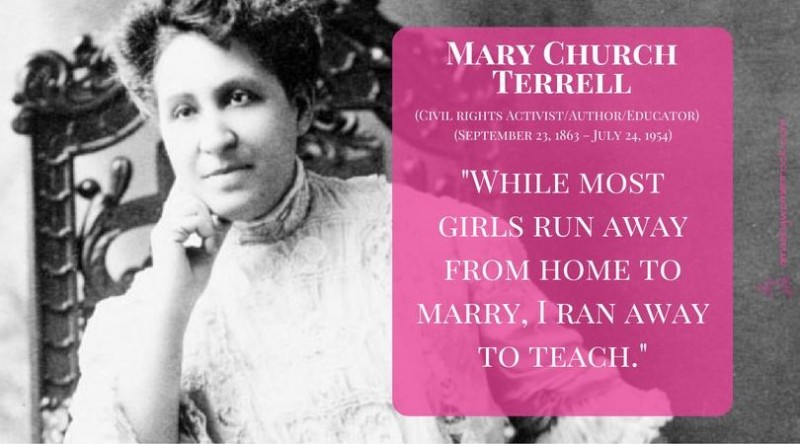Mary Church Terrell (Civil Rights Activist /Author/Educator)
Mary Church Terrell (September 23, 1863 – July 24, 1954)
"And so, lifting as we climb, onward and upward we go, struggling and striving, and hoping that the buds and blossoms of our desires will burst into glorious fruition ere long."
- one of the first African-American women to earn a college degree
- in 1909 she was a founding member of the National Association for the Advancement of Colored People
- 1896 she was the first African-American woman in the United States to be appointed to a school board of a major city, serving in the District of Columbia until 1906.
- 1896 founder and first president of the National Association of Colored Women.
- 1904 Terrell was invited to speak at the International Congress of Women, held in Berlin, Germany. She was the only black woman at the conference. She honored the host nation by delivering her address in German. She delivered the speech in French, and concluded with the English version.
She worked tirelessly in the women's suffrage movement, which pushed for enactment of the Nineteenth Amendment to the United States Constitution.
Terrell wrote an autobiography, A Colored Woman in a White World (1940).
In 1950 she started the fight to integrate eating places in the District of Columbia. In the 1890s the District of Columbia had formalized segregation as did states in the South. Before then, local integration laws dating to the 1870s had required all eating-place proprietors "to serve any respectable, well-behaved person regardless of color, or face a $1,000 fine and forfeiture of their license." In 1949, Dr. Terrell and colleagues Clark F. King, Essie Thompson, and Arthur F. Elmer entered the segregated Thompson Restaurant. When refused service, they promptly filed a lawsuit. Attorney Ringgold Hart, representing Thompson, argued on April 1, 1950, that the District laws were unconstitutional and later won the case against restaurant segregation. In the three years pending a decision in District of Columbia v. John R. Thompson Co., Terrell targeted other restaurants. Her tactics included boycotts, picketing, and sit-ins. Finally, on June 8, 1953, the court ruled that segregated eating places in Washington, DC, were unconstitutional.
Terrell continued to participate in picket lines, protesting the segregation of restaurants and theaters well past her 80's.
She lived to see the Supreme Court's decision in Brown v. Board of Education, holding unconstitutional the racial segregation of public schools. Terrell died two months later at the age of 90, on July 24, 1954.
- Tags: author civil rights educator
